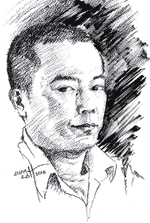
COMMENTARY
| By YENI | Wednesday, September 14, 2011 |
For years, Burma's state-run press displayed Stalinist-style slogans denouncing the foreign media, while never once displaying a photograph of pro-democracy leader Aung San Suu Kyi. So when readers picked up the state-run newspapers on the day after the meeting between Suu Kyi and Burma's President Thein Sein, most were surprised to see photos of Suu Kyi and no anti-Western media propaganda.
Many Burmese have suggested that this could be an indication that the regime is adopting a more conciliatory manner towards its critics and opponents. But at this point, a Burmese renaissance is a wish rather than a reality. It must be remembered that the same men running the current government ran the previous regime, and during their reign often paid lip service to reform without taking any meaningful and lasting action.
A case in point is the new Parliament. Although results on the current session are not yet in, the efforts of opposition political parties to institute reforms from within Parliament appear to have hit a brick wall called the United Solidarity and Development Party (USDP), which together with military-appointed MPs controls more than 75 percent of both houses of the legislature.
 |
| Yeni is news editor of the Irrawaddy magazine. He can be reached at [email protected]. |
In response to a proposal by opposition MP Thein Nyunt to enact a law to protect the right to freely express opinions in the media, Information Minister Kyaw Hsan said, “If press freedom is to be granted with a set of rules protecting the right to that freedom, there would be more disadvantages than advantages.” Afterwards, the proposal was discarded by the USDP majority.
It is safe to guess that a vast majority of the Burmese people would have loved to see these two proposed laws enacted, along with a prison reform act that was also rejected after a minister ludicrously claimed that prisoners in Burma are well treated.
So Parliament’s rejection of these proposals makes a mockery of the government’s new slogan, which was changed from “The Tatmadaw [armed forces] is Your Father and Mother” under the old regime, to the current: "The People's Voice is the Parliament's Voice; the People's Will is the Parliament's Will; and the People's Expectation is the Parliament's Implementation."
The Parliament did not, however, reject a proposal calling on President Thein Sein to grant a general amnesty for prisoners, including political prisoners. Interestingly, two delegations from the Burmese Army supported the proposal. But it was later surmised that their interest was not in gaining the freedom of the 2,000 or so prisoners of conscience in Burma’s jails, but that of the former spy chief, Khin Nyunt, and his Military Intelligence team that was purged and imprisoned in 2004.
Ultimately, the matter of amnesty is out of Parliament’s hands, and most likely out of Thein Sein’s as well. The matter will almost surely be decided by the 11-member National Defense and Security Council.
One other positive development, which for the time being remains superficial, was the Upper House approval of the formation of a “Peace Committee” to mediate the ongoing conflict between government forces and ethnic armed groups.
But it is unknown when the committee will be formed, how it intends to sell itself as an unbiased mediator and insert itself into the tense situation, or whether it will include Aung San Suu Kyi, who in August sent an open letter to Thein Sein and the ethnic groups stating that she is prepared to get involved and use her influence to help end the fighting.
Kristalina Georgieva, the EU commissioner for international cooperation, humanitarian aid and crisis response, recently visited Burma and met both Suu Kyi and government officials in Naypyidaw.
1 | 2 
|
||
|
||
|
||
|
||


Thailand Hotels
Bangkok Hotels
China Hotels
India Hotels

|